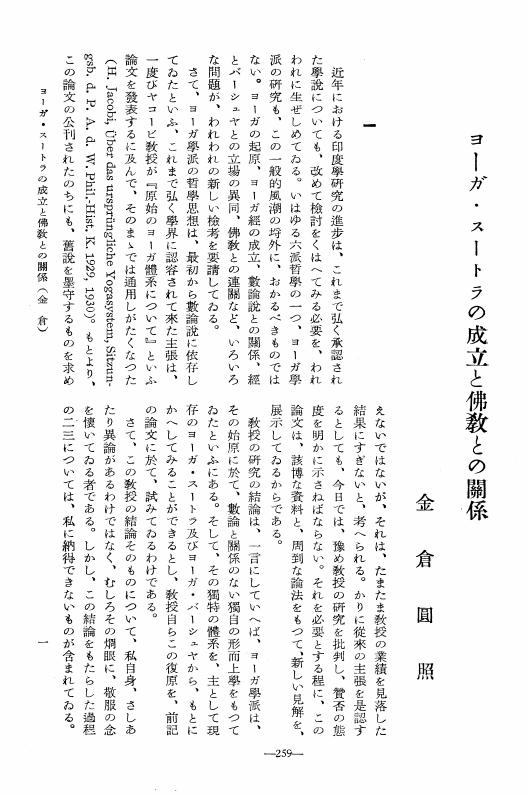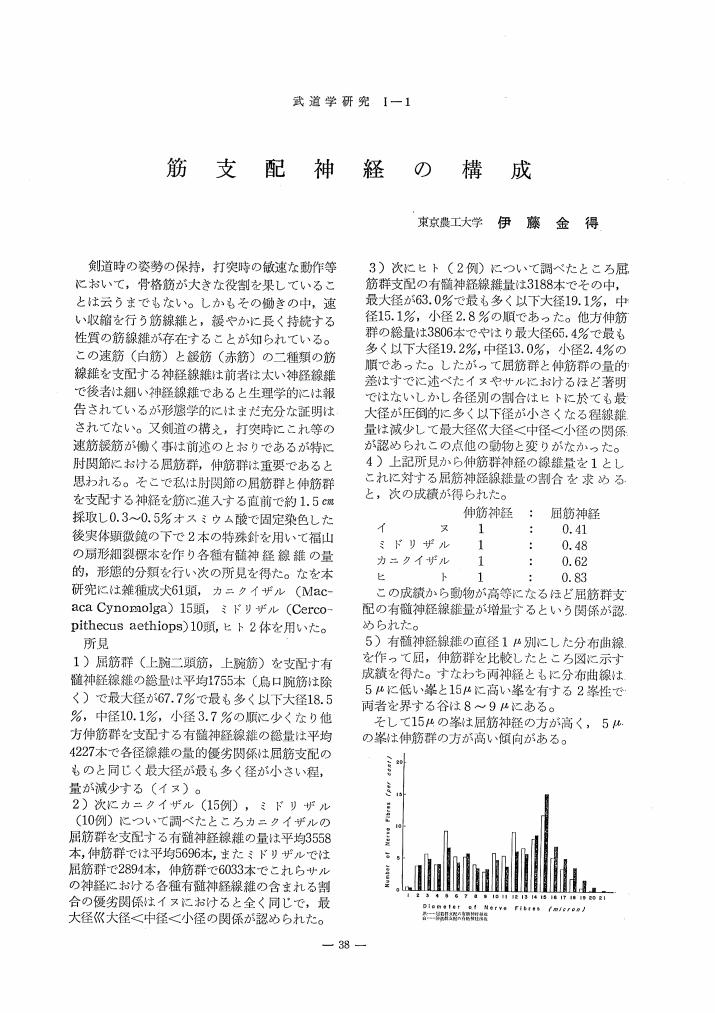2 0 0 0 OA 慢性めまい症に対して短期集中的な前庭リハビリテーションの有効性が示唆された一症例
- 著者
- 佐野 優衣菜 磯野 靖夫 中野 渉 藤山 啓太 金刺 優 下平 有希
- 出版者
- 一般社団法人日本理学療法学会連合
- 雑誌
- 理学療法学 (ISSN:02893770)
- 巻号頁・発行日
- vol.50, no.5, pp.195-200, 2023-10-20 (Released:2023-10-20)
- 参考文献数
- 30
【目的】原因が特定されていない慢性めまい症に対して,医師の指示のもと短期間の集中的な前庭リハビリテーションを実施し,バランス機能・日常生活動作の改善を認めた症例を経験した。先行研究と比較し,移動能力改善に大幅な効果が得られたと考えられたため報告する。【症例】60歳代男性。診断名:めまい症。めまいの増悪があり救急搬送され入院となった。主治医よりめまいのリハビリテーションの適応と判断され,理学療法介入をした。前庭リハビリテーションは1日40分,頻度は週5回とし,1回10分1日4回の自主トレーニングを指導した。第20病日に自宅退院となった。自覚症状の強度に改善はみられなかったが,バランス機能,移動能力,日常生活動作能力で改善がみられた。【考察】低頻度の介入である先行研究と比較し,移動能力は短期的に大幅な改善がみられた。【結論】短期間の集中的な前庭リハビリテーションは効率的に効果を得られる可能性があると考えられる。
2 0 0 0 OA ヨーガ・スートラの成立と佛教との關係
- 著者
- 金倉 圓照
- 出版者
- Japanese Association of Indian and Buddhist Studies
- 雑誌
- 印度學佛教學研究 (ISSN:00194344)
- 巻号頁・発行日
- vol.1, no.2, pp.259-268, 1953-03-25 (Released:2010-03-12)
2 0 0 0 OA Shuddering attacks (身震い発作) を呈した4例
- 著者
- 金澤 治 白根 聖子 早川 さゆり
- 出版者
- 一般社団法人 日本小児神経学会
- 雑誌
- 脳と発達 (ISSN:00290831)
- 巻号頁・発行日
- vol.32, no.5, pp.424-429, 2000-09-01 (Released:2011-08-10)
- 参考文献数
- 6
Shuddering attacks (SA, 身震い発作) は乳幼児期に発症する稀な良性疾患といわれ, てんかんとの鑑別を要する.発作は意識消失のない何秒間かの身震いで日単位で反復する.Essential tremor (ET, 本態性振戦) と同様の発現機序といわれ脳の未熟性による表現様式の違いとされるが, 報告は稀で本邦では皆無である.SAを呈する生後8~14カ月の乳幼児4例で, ビデオないしビデオ・脳波同時記録で発作時をとらえ病態を検討した.1例でSAに同期した筋電図より, ETの周波数とほぼ一致した.全例で発作減少ないし消失をみたが, MRI上脳の未熟性, トルコ鞍扁平, てんかんの家族歴, のある例もあった.従来SAは良性疾患で検索不要といわれるが, 神経系発達に関連した何らかの問題が潜む可能性がある.
2 0 0 0 OA 低血糖症例に対する救急救命士による20%ブドウ糖溶液投与の効果
- 著者
- 笠岡 俊志 金子 唯 原田 正公 奥本 克己 前原 潤一
- 出版者
- 一般社団法人 日本臨床救急医学会
- 雑誌
- 日本臨床救急医学会雑誌 (ISSN:13450581)
- 巻号頁・発行日
- vol.23, no.2, pp.146-150, 2020-06-30 (Released:2020-06-30)
- 参考文献数
- 6
救急救命士による低血糖症例へのブドウ糖溶液の投与に関して,熊本県メディカルコントロール協議会では20%ブドウ糖溶液を用いることを決定した。熊本県の全消防本部に依頼して,低血糖のため救急救命士が20%ブドウ糖溶液40mlを投与した症例を対象にして,ブドウ糖溶液投与前後の意識レベル(Japan Coma Scale)と血糖値を調査した。対象症例は30例で,男性18例,年齢は72歳(中央値)。ブドウ糖溶液投与から病院到着までの時間は7.5分(中央値)。血糖値(中央値)はブドウ糖溶液投与前の38mg/dLから病院到着時には88mg/dL まで有意に上昇した。病院到着時の意識レベルは30例中24例(80%)で改善を認めた。病院前における低血糖症例に対する20%ブドウ糖溶液の投与は,血糖上昇および意識レベル改善に一定の効果が期待でき,高張な50%ブドウ糖溶液投与のリスクを考慮すると病院前において有用かもしれない。
2 0 0 0 OA 川崎病の治療経過中に認められた偽性高カリウム血症の1乳児例
- 著者
- 杉本 圭 千葉 幸英 鏑木 陽一郎 金子 裕貴 鶴田 敏久 永田 智
- 出版者
- 東京女子医科大学学会
- 雑誌
- 東京女子医科大学雑誌 (ISSN:00409022)
- 巻号頁・発行日
- vol.89, no.1, pp.7-12, 2019-02-25 (Released:2019-02-28)
- 参考文献数
- 11
A 3-month-old girl was diagnosed with Kawasaki disease 4 days after onset and intravenous immunoglobulin (IVIG) treatment was started on the same day. Because IVIG therapy was ineffective, a combination of IVIG and prednisolone was administered on day 6. On day 9, the patient had hyperkalemia (6.5 mEq/L) without electrocardiographic abnormalities. The serum potassium level measured in blood collected in heparinized tubes was within normal range. We diagnosed pseudohyperkalemia leading to leukocytosis and thrombocythemia, attributable to coagulation system activation and increased release of potassium from leukocytes and/or platelets. Serum potassium levels in patients with potential hyperkalemia under these conditions may require greater consideration.
- 著者
- 廣重 亮一 村上 知徳 曽我部 昭好 井上 章二 金城 一彦
- 出版者
- 公益社団法人 日本木材保存協会
- 雑誌
- 木材保存 (ISSN:02879255)
- 巻号頁・発行日
- vol.42, no.4, pp.199-207, 2016 (Released:2016-10-01)
- 参考文献数
- 18
- 被引用文献数
- 1 1
実建物を模したミニチュアハウスを用いた野外暴露試験により,住宅建築における基礎周囲や基礎内部におけるシロアリの活動状況について検討した。無処理区では基礎配管部からシロアリが侵入し,PEシートの端部を通過し,土間コンクリートの出隅部に生じたわずかな隙間を通り,基礎入角部に蟻道を構築した。さらに,蟻道は基礎パッキン上を延び,土台,柱,野地板などが食害された。土壌に敷設したPEシートの裏側の蟻土の付着率からシロアリがPEシート下のほぼ全面で活発に活動していることを明らかにした。防蟻処理区では7.9年経過後も基礎内への蟻道の構築は見られなかった。またPEシートの蟻土の付着率も無処理区の半分で,新たな蟻土の付着は見られず,防蟻施工がシロアリ侵入防止に有効であることが示された。
2 0 0 0 OA 看護師によるスピリチュアルケアの実践を測定する尺度の妥当性と信頼性の検討
- 著者
- 實金 栄 橋本 優 井上 かおり 梅本 愛実 笠松 奈央 小薮 智子 白岩 千恵子 岡本 宣雄 竹田 恵子
- 出版者
- 日本臨床倫理学会
- 雑誌
- 臨床倫理 (ISSN:21876134)
- 巻号頁・発行日
- vol.6, pp.18-31, 2018 (Released:2021-07-12)
- 参考文献数
- 73
本研究は日本の看護師を対象に,スピリチュアルケアの実践指標(nurses’ spiritual care practices;NSCP)を開発し,その実践指標の尺度としての妥当性と信頼性を検討することを目的とした。対象は日本の看護師1,058人。尺度の妥当性は,前提となるケア,信じる・共にいる,協働,存在探求へのケアの4因子を一次因子,スピリチュアルケアを二次因子とするモデルを仮定し,このモデルの構成概念妥当性を検討した。さらに道徳的感受性との関連で併存的妥当性,ヒューマンケアとの関連で収束的妥当性を検討した。分析の結果,構成概念妥当性,併存的妥当性および収束的妥当性は検証された。NSCPにより測定された看護師のスピリチュアルケア実践は,存在探求へのケアが最も低く,この実践力向上が課題と考えられた。そのため,看護師自身がスピリチュアルケアに向き合うことへの覚悟を支える支援が求められる。
2 0 0 0 OA バイオアッセイ法
- 著者
- 金 ウンジュ 栗原 治 大町 康
- 出版者
- 公益社団法人 日本アイソトープ協会
- 雑誌
- RADIOISOTOPES (ISSN:00338303)
- 巻号頁・発行日
- vol.63, no.5, pp.249-255, 2014-05-15 (Released:2014-05-29)
- 参考文献数
- 14
- 被引用文献数
- 2 2
バイオアッセイ法は,被検者から採取された生体試料(主に排泄物)中に含まれる放射性核種を定量する方法であり,その結果は内部被ばく線量評価を行う上での基礎データとなる。バイオアッセイ法の利点は,体外計測法では測定が困難なα線やβ線のみを放出する核種に適用できることであり,プルトニウムを初めとしたアクチノイド核種に対しても十分な検出感度を有している。しかしながら,試料の放射線計測を行う前に必要となる前処理,化学分離等の工程に時間を要するため,緊急被ばく医療の観点からは迅速化が求められる。本稿では,アクチノイド核種を対象としたバイオアッセイ法の概要を中心に解説する。
2 0 0 0 OA 武道の本質(1)修行者の立場から
- 著者
- 佐藤 金兵衛
- 出版者
- 日本武道学会
- 雑誌
- 武道学研究 (ISSN:02879700)
- 巻号頁・発行日
- vol.1, no.1, pp.23, 1968-12-25 (Released:2012-11-27)
2 0 0 0 OA 柔道投げ技の類型的研究
2 0 0 0 OA 筋支配神経の構成
- 著者
- 伊藤 金得
- 出版者
- 日本武道学会
- 雑誌
- 武道学研究 (ISSN:02879700)
- 巻号頁・発行日
- vol.1, no.1, pp.38, 1968-12-25 (Released:2012-11-27)
2 0 0 0 OA 役割語のジェンダーとパワー
- 著者
- 金水 敏
- 出版者
- 社会言語科学会
- 雑誌
- 社会言語科学 (ISSN:13443909)
- 巻号頁・発行日
- vol.26, no.1, pp.37-48, 2023-09-30 (Released:2023-10-31)
- 参考文献数
- 22
本稿では,定延 (2011) に示された「性・格・品」の連動」および靳 (2016) で観察された「権力による性差の中和」現象の詳細な構造について検討していく.主たる理論的枠組みとしてポライトネス理論を用い,「権力による性差の中和」を「(女性の発話における話し相手への)フェイス・リスク配慮の原則」から説明する.またこれとは別に,「(女性の発話における)品位保持の原則」を設定し,なおかつこの原則もまた女性の発話を弱める効果を持つことを主張する.
2 0 0 0 OA 脾温存膵体尾部切除術術後に孤立性胃静脈瘤が発生した1例
- 著者
- 金丸 理人 小泉 大 志村 国彦 笹沼 英紀 俵藤 正信 佐田 尚宏 安田 是和
- 出版者
- 一般社団法人 日本消化器外科学会
- 雑誌
- 日本消化器外科学会雑誌 (ISSN:03869768)
- 巻号頁・発行日
- vol.46, no.7, pp.487-493, 2013-07-01 (Released:2013-07-10)
- 参考文献数
- 18
症例は70歳の男性で,2008年9月,近医での血液検査にて肝機能障害を指摘され,精査目的に当科紹介受診し,膵管内乳頭粘液性腫瘍intraductal papillary-mucinous neoplasm(IPMN)と診断された.2009年6月,脾温存膵体尾部切除術(spleen-preserving distal pancreatectomy;SPDP)を施行した.術後第25病日に,ドレーンからの出血を認め,膵液瘻による胃十二指腸動脈瘤の破裂を認め,血管塞栓術を行い,術後第66病日で退院した.2009年11月(術後5か月),腹部CTを施行したところ,胃静脈瘤が描出された.上部消化管内視鏡検査でも穹隆部に孤立性の胃静脈瘤(Lg-cf,F2,Cb,RC(–))を確認できた.SPDP術後に脾静脈が閉塞し,孤立性胃静脈瘤が発生した1例を経験したので文献的考察を加えて報告する.
2 0 0 0 OA 知識と懐疑、古代と近現代 ソクラテスとヒュームが自らの心の内に観察したもの
- 著者
- 金山 弥平
- 出版者
- 日本哲学会
- 雑誌
- 哲学 (ISSN:03873358)
- 巻号頁・発行日
- vol.2003, no.54, pp.71-91,239, 2003-04-01 (Released:2009-12-09)
Ancient and modern skepticism are said to be different in that (1) ancient skeptics attacked beliefs, while modern skeptics are challenging knowledge (justified true belief); (2) ancient skeptics considered it possible to live without beliefs, following 'appearances', while modern philosophers consider it impossible, as is typically represented by Hume's judgement; (3) ancient skeptics took skepticism to be the best way to attain happiness, while such a demand may be incredible to philosophers today. But are these differences really substantial? As to (1), the state of mind to which justified true belief corresponds in Greek philosophy is doxa (belief) rather than episteme (knowledge); modern skeptics may be regarded by ancient skeptics as challenging belief rather than knowledge. As to (2), when e.g. a car rushes toward them, Pyrrhonists and Humeans will both evade the car, with the processes in their minds being almost the same, and different only in names ('appearances' and 'beliefs'). However, there is at least one substantial difference: if ancient skeptics' claim in (3) is true, Pyrrhonists can lead a better life than Humeans, by following appearances of moral virtues and also suspending judgement about the sufferings their moral activities may cause to them. To Humeans, who hold that reason is the slave of the passions, Pyrrhonists' claim to achieve happiness by rationally suspending judgement may appear to be the result of neglecting observation. But the reason's power that enables men to lead a good life, in which ancient skeptics believed, was what Socrates actually observed in his own mind and handed down to posterity.
- 著者
- 金子 真之 大内 紀知
- 出版者
- 一般社団法人 経営情報学会
- 雑誌
- 経営情報学会 全国研究発表大会要旨集 2015年秋季全国研究発表大会
- 巻号頁・発行日
- pp.164-167, 2015 (Released:2016-01-29)
ネットワーク効果が働く製品では、市場シェアの獲得が競争優位性の構築につながるため、ある企業が一度高い市場シェアを獲得すると、他社がその市場でシェアを獲得することが困難となる。しかし、近年、ネットワーク効果が働く典型的な製品であり、これまでMicrosoft社が圧倒的な市場シェアを有していたOS市場において、Apple社のOSが急増するという注目すべき事象が見られる。本研究では、スマートフォン市場とタブレット型端末市場におけるApple社の市場シェアの高さに着目し、それらの市場からのネットワーク効果がOS市場における消費者の購買意思決定行動に与える影響を明らかにする。
2 0 0 0 OA 書評
- 著者
- 金信 泰造 笹渕 祥一 示野 信一
- 出版者
- 一般社団法人 日本数学会
- 雑誌
- 数学 (ISSN:0039470X)
- 巻号頁・発行日
- vol.49, no.3, pp.326-335, 1997-07-30 (Released:2008-12-25)
- 参考文献数
- 13
2 0 0 0 OA 引き裂かれる「絵本」
- 著者
- 金子 亜由美
- 出版者
- 論潮の会
- 雑誌
- 論潮 (ISSN:18821982)
- 巻号頁・発行日
- vol.15, pp.1-22, 2022-08-10 (Released:2023-10-02)
2 0 0 0 OA 化学系ブティック型(領域特定型)日本企業へのステージゲート法適用の課題と提案
- 著者
- 金子 浩明 久保 裕史
- 出版者
- 一般社団法人 国際P2M学会
- 雑誌
- 国際P2M学会誌 (ISSN:24320374)
- 巻号頁・発行日
- vol.9, no.1, pp.95-106, 2014 (Released:2017-06-02)
- 参考文献数
- 15
- 被引用文献数
- 9
ステージゲート法は80年代に北米で開発され、多くのハイテク製造業に普及した。日本では90年代後半から普及したが、導入する際は日米の事業環境の違いを考慮する必要がある。米国はベンチャーキャピタルの資金が豊富で大学発ベンチャーが多く存在し、種となる技術の候補が外に多く存在しているため、多産多死型の研究テーマ管理が可能である。一方、日本では内部で産まれた種を大事に育てる必要がある(少産少死型)。しかし、ステージゲート法は段階的にテーマに絞り込んでいくので、育てる工夫が欠けるとテーマが枯渇してしまう。本論では日本のブティック型の化学系企業を題材に、少産少死型の研究開発に適したステージゲート法を提案する。
2 0 0 0 OA 腹腔鏡手術が有用であった脳室腹腔シャントチューブ横行結腸内迷入の1例
- 著者
- 宮城 良浩 金城 達也 狩俣 弘幸 下地 英明 西巻 正
- 出版者
- 日本臨床外科学会
- 雑誌
- 日本臨床外科学会雑誌 (ISSN:13452843)
- 巻号頁・発行日
- vol.75, no.7, pp.1915-1918, 2014 (Released:2015-01-31)
- 参考文献数
- 13
- 被引用文献数
- 2 2
症例は20歳,男性.0歳時,髄膜瘤に対する手術の際に,脳室腹腔シャント(VPシャント)を造設.8歳時に水頭症発症し,シャント入れ替えが施行されていた.3カ月前より右前胸部シャント挿入創に肉芽形成を認め,1カ月前に同部位から排膿を認めるようになり,シャント感染が疑われた.シャント抜去術が予定されたが,術前腹部CTでチューブの腸管内迷入所見を指摘.腹部に圧痛はなく,腹膜刺激症状はみられなかった.腹腔鏡による腹腔内観察では,チューブ先端が横行結腸内へ迷入していたため,小開腹にてチューブを抜去し腸管を修復した.術後抗生剤投与により前胸部創感染は改善し,今後は経過観察し,水頭症が出現した場合にシャント再造設を予定することとなった.VPシャントチューブの消化管穿通はまれな合併症であるが,本症例では診断および治療に腹腔鏡下手術が有用であった.





